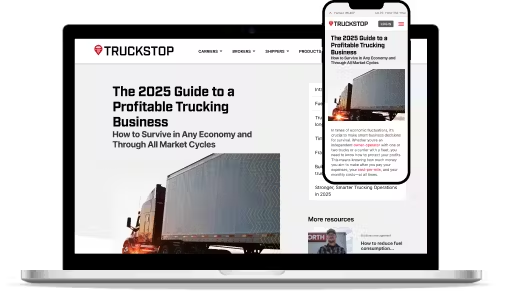
Real-world economics for trucking: how to thrive in any market

Make data-driven decisions.
Grow your business with competitive pricing and negotiating.
In an uncertain economy, your priority is to keep your trucking business moving forward, regardless of what happens. Instead of worrying about the “what-ifs,” it’s time to focus on what you can control to not only survive but thrive in 2023.
Brent Hutto, Truckstop’s chief relationship officer, and Noel Perry, Truckstop’s chief economist have created a four-part webinar series to help you understand and navigate the economy and show you steps to take now to succeed in any market.
2023 forecasting: navigating uncertain times
The trucking industry has been riding out industry highs over the past few years, but as the economy changed in 2022, so did business. The perfect storm of rising fuel costs and a shortage of drivers, trucks, and parts caught carriers unprepared and scrambling to make ends meet. Drivers are still hesitant about what this market means for their livelihood.
So how does someone in the trucking industry navigate the unknown and find a way to get ahead?
They manage uncertainty by planning for these possible circumstances.
- The market continues to increase.
- The market stays the same.
- The market declines to a historically normal level.
The best defense is a good offense to give yourself a strategic advantage over your competition, and now is the time to start planning.
Watch or listen to learn simple steps to take now to protect your business.
Inflation: what is it?
If you ask almost anyone what inflation is, you’ll likely hear something about higher prices and lower profits. Both are correct. But inflation is more than that, and it impacts how the trucking industry does business, from brokers to carriers to shippers.
Knowing how to proactively deal with inflation changes is like using the bumpers when you bowl; it keeps your business out of the gutter.
Let’s break down what inflation means for the transportation business specifically.

Inflation for carriers
Carriers need to consider costs and contracts extra carefully in 2023. To make a profit on each load, you must agree to contracts that take into account your profitability after you take inflation out. That means you need to build inflation into contracts, so you don’t lose money. This includes how you price mileage pay per load and fuel surcharges with every haul.
Keep in mind, if you only agree to contracts that are priced too high, you’ll lose business. If you price yourself too low, you’ll lose money. The biggest thing to know about inflation is that if you don’t plan properly, it can devalue your profitability and your income.

Inflation for brokers
For a broker, inflation is primarily challenging when it comes to pricing loads for carriers. Brokers must understand the market to avoid losing freight volume. The increase in truck freight costs, fuel, and wages due to the driver shortage, should all be calculated into every load.
Carefully price each load to ensure you’re making money and keeping your carriers happy, and they will want to continue to work with you in the future. In the end, carriers and brokers are trying to make money. Knowing what you can do in a changing market will set you up for success now—and in the future.
Watch or listen to learn more.
The 5 “whys” of inflation
To manage inflation for your trucking business, you need to get to the root of the cause.
Inflation can be linked back to five main changes or “whys”, each with its own implications.
- Value
- Productivity
- Costs
- Market conditions
- Supply of money

Understanding what each “why” means for you
- Change in value affects the perceived value of goods and services. For truckers, this means the increasing prices of a high-quality truck. The out-of-pocket cost may be alarming, but don’t fail to account for the benefits. The change in value gives you better fuel efficiency and modern technology, which ultimately lowers your operating costs.
- Change in productivity reflects the effectiveness of the market. As productivity goes up, costs go down. But a decrease in productivity will send prices soaring. For example, supply chain failures in the past few years decreased productivity, driving up the cost for goods, services, and transportation due to supply and demand. When it comes to trucking, change in productivity isn’t just tied to the market but also regulations like training requirements and speed regulations.
- Change in cost is tied to what’s happening in the trucking industry specifically. A good example is the shortage of owner-operators. Less drivers means an increase in the charge per load. Brokers, carriers, and shippers need to consider this as they negotiate contracts.
- Change in market conditions have the biggest effect on inflation for truckers, at least in the short term. The push and pull of supply and demand gives owner-operators the ability to hold out for the most money. Less trucks in the market and drivers on the road mean they can get more for every load.
- Change in money supply creates caution in the trucking industry. When businesses lose trust in the market, they get worried and raise prices to create a buffer for any unforeseen expenses and alter the way business is conducted. Often, these changes are permanent.
Find out practical ways your trucking business can plan for the “whys” this year. Watch or listen for tips to get started.
Inflation: what to do about it
Inflation makes pricing complicated for shippers, brokers, and carriers. But if you don’t factor it into the way you do business, you could stall out in a hurry.
Smart truckers who plan to be in it for the long haul find ways to adapt their business and pricing and continue to thrive even in the toughest of times.
To be successful, you should always know these three things:
- Your costs for equipment, interest rates, fuel, and labor and by what amount they have changed
- The type of economic period you’re in and the percentage inflation has increased or decreased
- How your trucking productivity has changed and where you can gain operational efficiencies
Knowing these gives you a critical competitive edge to show the value of rate changes in a meaningful way. This will increase your earning potential and can mean the difference between profitability and closure.
Don’t let inflation control your business. Watch or listen for ways to negotiate fair pricing in any market with confidence.
Recession-proof your trucking business with this FREE guide!



